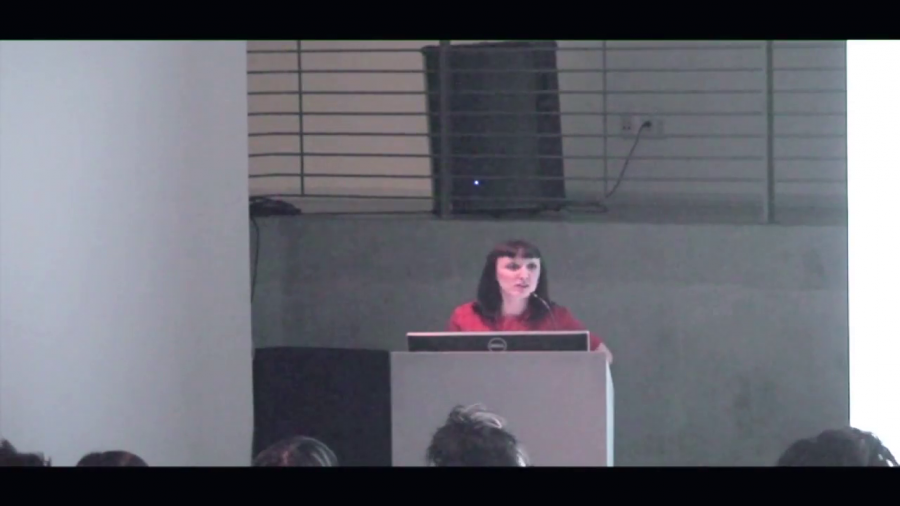Marika Cifor: I want to thank the organizers and all of you for being here today. I’m very excited to be a part of what I understand is starting these conversations in Design Media Arts. I’m going to focus primarily today on the pedagogical end of what I do here at UCLA, and conclude a bit by talking about the research I’m just beginning for my dissertation, which does take up some of these issues as well.
What I’m arguing primarily today is that focusing on pedagogy (I’m going to be talking mostly about formal pedagogy in the classroom with undergraduates.) is a key aspect of social justice work, and that teaching critical data literacy along with other digital literacy skills is a key part of what we need to do.
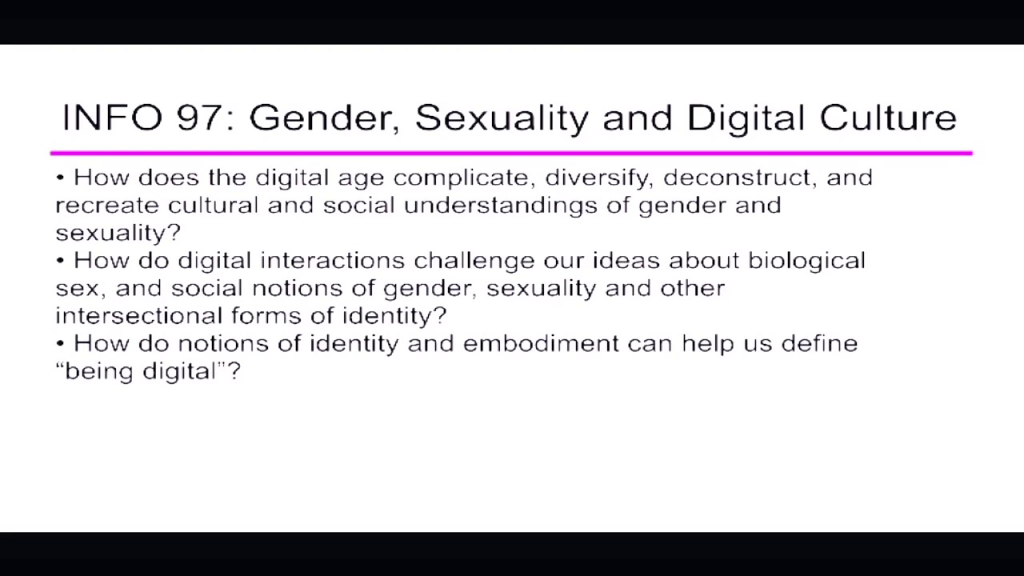
I’m going to talk about two different courses. The first is one that I’ve proposed but have not yet taught on gender, sexuality, and digital culture. The idea for this course came from my own interest and engagement with ideas on the feminist Internet, as well as teaching. I was a TA in the Intro to LGBT Studies class, and we got to the end and realized that we really hadn’t done much with digital culture, and is it really a responsible and effective with our undergraduates to talk about what being LTBTQ means, or the potentialities for LGBTQ identity and life today without talking about the digital?
I’ve also found, related to that, that talking about the digital is a very powerful way to talk about social justice with undergraduates. It already has a key relevancy to their everyday lives, and it can make some difficult concepts easier to grasp in that way, when there’s already at least some kind of level of understanding and engagement. It also heightens the importance of doing that work.
This course takes on a number of key questions. Thinking about what it means in the digital age to think about gender and sexuality, both how notions of identity and embodiment change with the digital, how those notions of gender and sexuality don’t change within digital, and how those translate into new forms of media. And so I want to give you a couple of examples from each of the classes I’m going to talk about, some of what happens there.
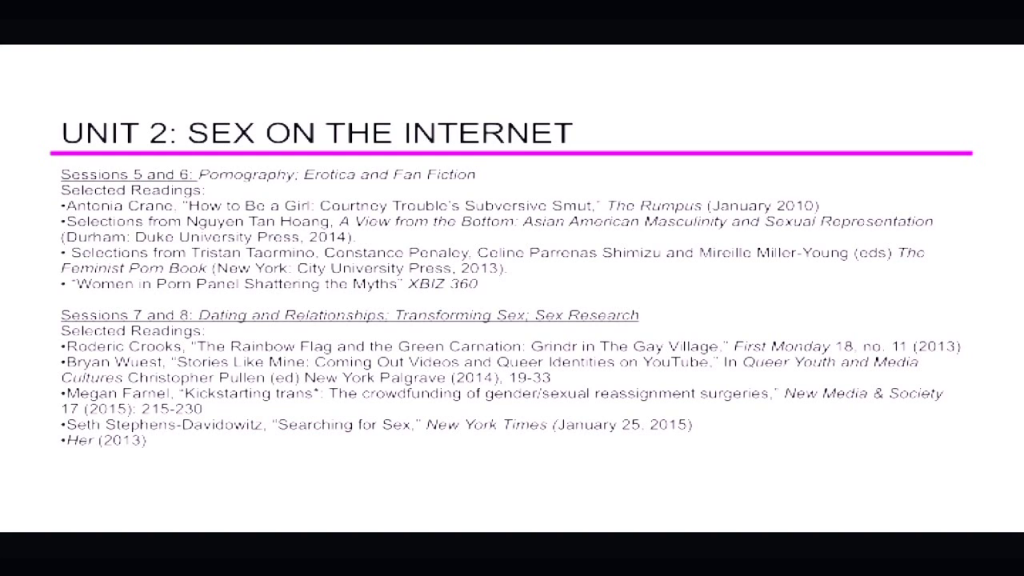
This is just one of the units (this’ll become clearer when I talk about my own research as well), but I’m particularly interested in how sexuality translates onto the Internet and how ideas of embodiment work in a digital space. And I think that this unit of the course focuses on how the digital affects our feelings and relationships, as documented in digital technologies and how those digital technologies might alter, augment, or distance the way people relate to one another, and how the Internet intervenes into the provenance of the body.
Topics in this section include, of course, online dating and relationships, pornography, research on sex on the Internet, both what we can learn about sex and sexuality from what people are searching in particular. There’s really fascinating Big Data work on what you can learn from what people are searching about their interests, desires, etc. and what you can’t learn, how those truths are reflected or not in a digital space.
This section of course deals also with the implications for how dating and relationships look different on the Internet. The possibilities for community, as well as issues thinking about the potential for crowdsourcing (you’ll see there’s an article on Kickstarting trans) and how that might engage people in different communities and identity practices that they were not engaged in before, or expanding those communities in new ways.
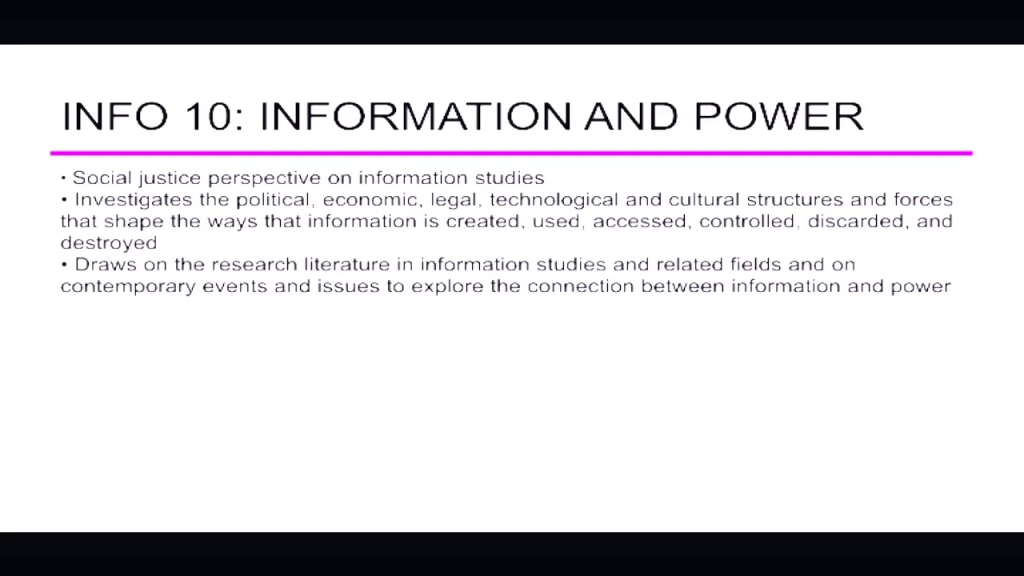
The other course I want to talk briefly about is one that I’m teaching right now to thirty undergraduates. It’s one of our core courses, or one of our three courses offered to undergraduates in Information Studies. It’s a GE course, so it’s open to any undergraduate. We don’t have our own major at the moment in Information Studies. Our department has an explicit social mission, and it’s one of the reasons that many of us as students and faculty are drawn to this department and to this discipline.
This course takes a very explicit focus on social justice to investigate the political, the economic, the legal, and the technological aspects of the way in which information is created, accessed, used, controlled, discarded, and destroyed. It draws on a huge and interdisciplinary set of literature from information studies and related fields, and it focuses particularly on the digital and on contemporary events to explore issues of information and power.
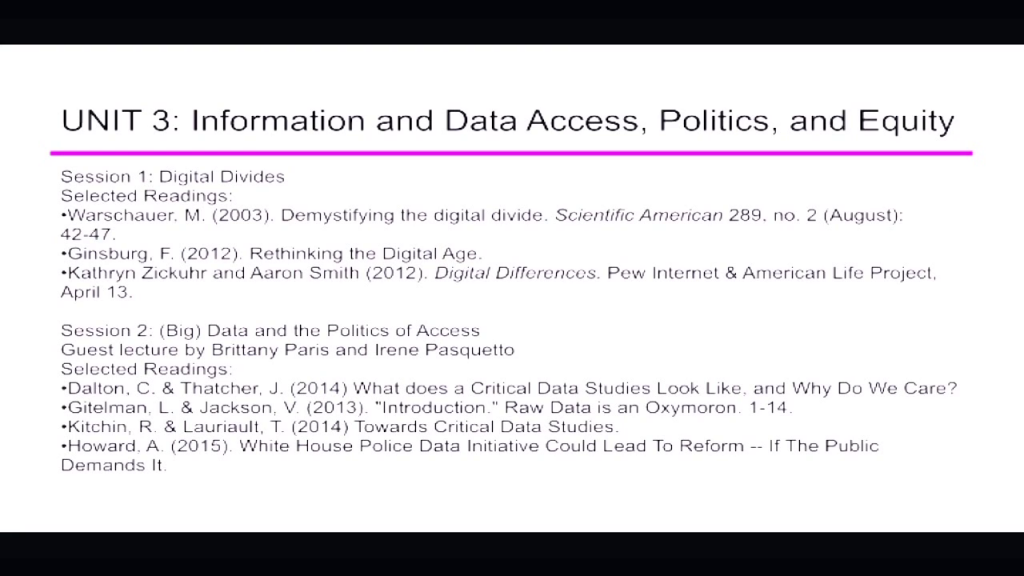
I want to talk briefly here about one unit of the course. Whether or not there are in fact digital divides and who might be… Is “divide” even a useful way of conceptualizing differential access? Is Internet access a human right, and if it is how do we actually enact that? Ginsburg’s work focuses particularly on the use of indigenous communities to rethink and to explore in new ways their own identities and to give people access to indigenous knowledges. This unit also, I have the privilege of bringing in two of my fantastic colleagues who are doing a very important project on police data practices, and their work is able to talk to give an important instance of what critical data studies are.
And I think critical data studies are an important segment of that larger project of teaching social justice because we live in a world where data is constantly being collected about us. We’re constantly creating data, but we don’t always think of data as something that has a point of view and a perspective from design onward. And I’m hoping that by educating a set of undergraduates we can create a more critical set of designers, users, educators, and those engaged with technology.
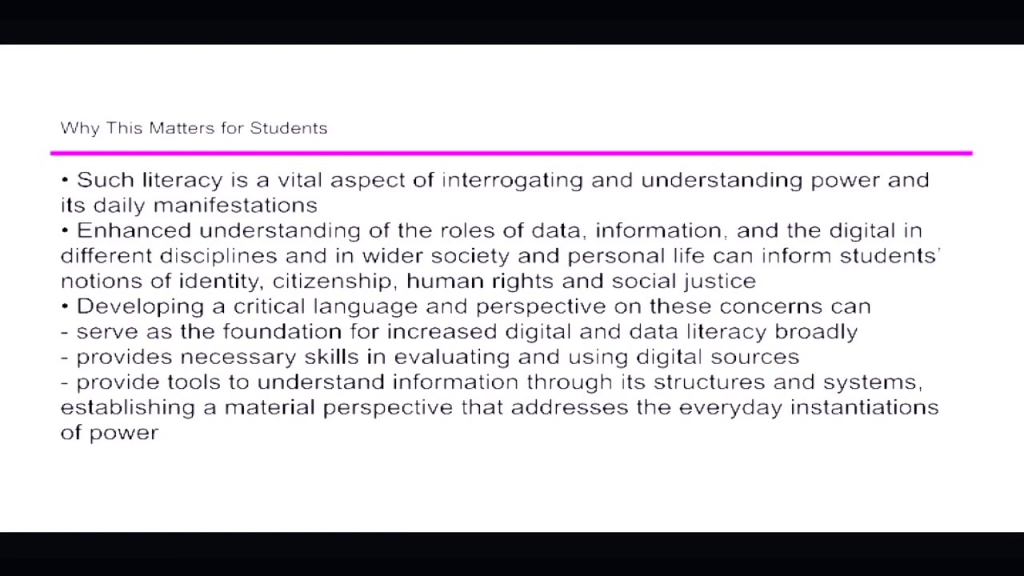
I think there’s a number of reasons why doing this work really matters for students. I see this as part of my own engagement in social justice concerns. I think for students to actually be able to interrogate issues of power and information, they need to understand and be literate in data and thinking about issues liked the other two presenters have already talked about about the biases of the technologies they’re engaging with. I also think that enhancing their understanding of the roles of data, information, and the digital more broadly and giving them access to a different set of of disciplinary knowledge can inform their intellectual lives, their personal lives, their lives as citizens in a globalized world. And thinking about how such education might impact their identities and their own reflections on social justice work.
All of this work is aimed at giving them a critical vocabulary and perspective on these concerns, introducing them to the idea that search engines have biases. They all use search engines, but most of them have never thought critically about them as a tool. So this is a really exciting possibility to get them to think critically about the structures that are often invisible in their daily lives.
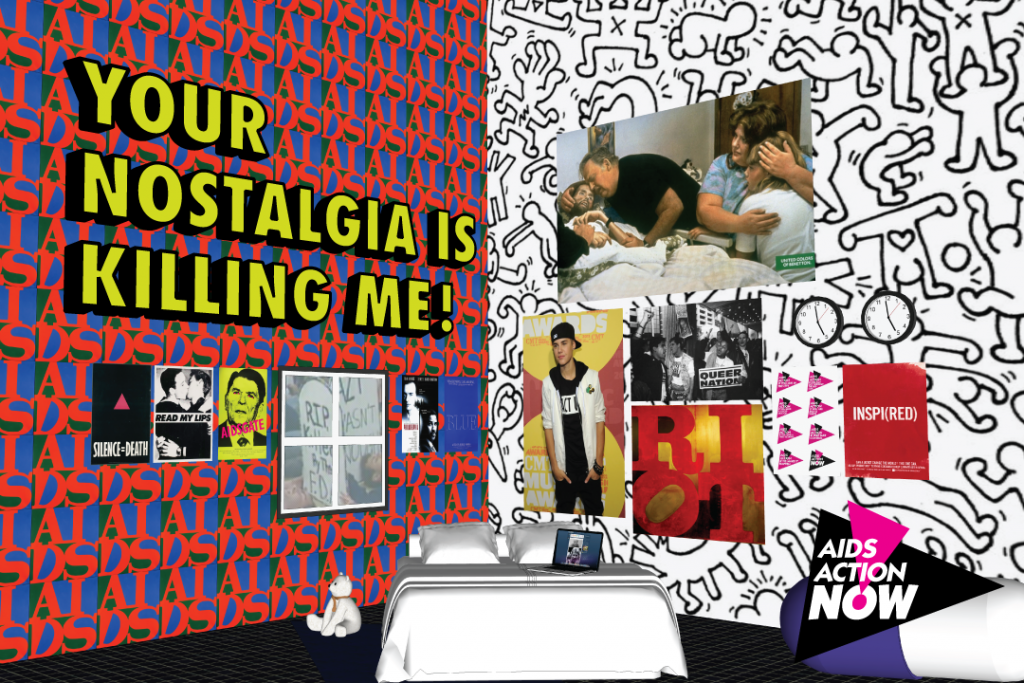
“Your Nostalgia is Killing Me”, Vincent Chevalier with Ian Bradley-Perrin
I also want to talk very briefly, and we can talk more about this in the Q&A, about my own project. This is my third year in the department so I am developing my dissertation project this year, which is very tentatively titled “Your Nostalgia is Killing Me.” This project takes its title from the poster you see here, which is by two activist artists, Vincent Chevalier and Ian Bradley-Perrin. In the setting for this poster, it’s designed to look like a teenage bedroom; you see the bed there in the center. And the images are of course those of AIDS cultural productions from the 1980s and 1990s. You’ll see out the window there’s an ACT UP political funeral. Closer to us on the left there’s some other ACT UP images. You’ll notice the Keith Haring drawing on the other wall, just as a few examples. And there is of course on the other side Justin Bieber wearing, inexplicably, an ACT UP t‑shirt, and images of corporate campaigns for AIDS activism.
Through the emblematic signifiers, the artists assert that the nostalgic focus on AIDS of the past result in an important neglect of the contemporary nature of the AIDS crisis and therefore prevents critical life-saving actions from being initiated and put into place. My project I should note is centered in critical archival studies. This poster [was] put up in three different cities, and then put up online and generated a lot of discussion, a lot of intergenerational discussion, particularly amongst those interested in AIDS activism and art. Those conversations extended into the archive and of course some of these images, though obtained through Google, are archival images.
So I’m interested in how in the three decades since AIDS was first identified and entered the realm of public discourse, how it’s become far more than a biomedical event. The HIV/AIDS crisis, as I see it, is a fundamentally cultural phenomenon as well. It has generated a vast body of representation, even greater collection of experiences, affects, knowledge, and cultural activism. And an important part of that current cultural activism, it could be argued, is the imperative to build an archive of AIDS knowledge that would otherwise be neglected, marginalized, suppressed, or forgotten.
And so as a result, I’m going to be looking at just a couple of the archival projects that have been developed globally to collect, preserve, and make accessible political, artistic, and medical knowledge. So I’m deeply interested an engaged in the issues of how archives can capture or relate to human experiences that are difficult to document, whether those are embodied experiences or feelings. So for me, this project will be about what the work of nostalgia does or doesn’t do and how it shaped the experiences, understandings, commodification, and memory of HIV/AIDS through the archives and its activist movements. So I’m happy to talk more about that project during Q&A, but I wanted to bring together those two ends.
Thank you.
Further Reference
Later, there were a panel discussion and Q&A session.
Biased Data: A Panel Discussion on Intersectionality and Internet Ethics at the Processing Foundation web site.
